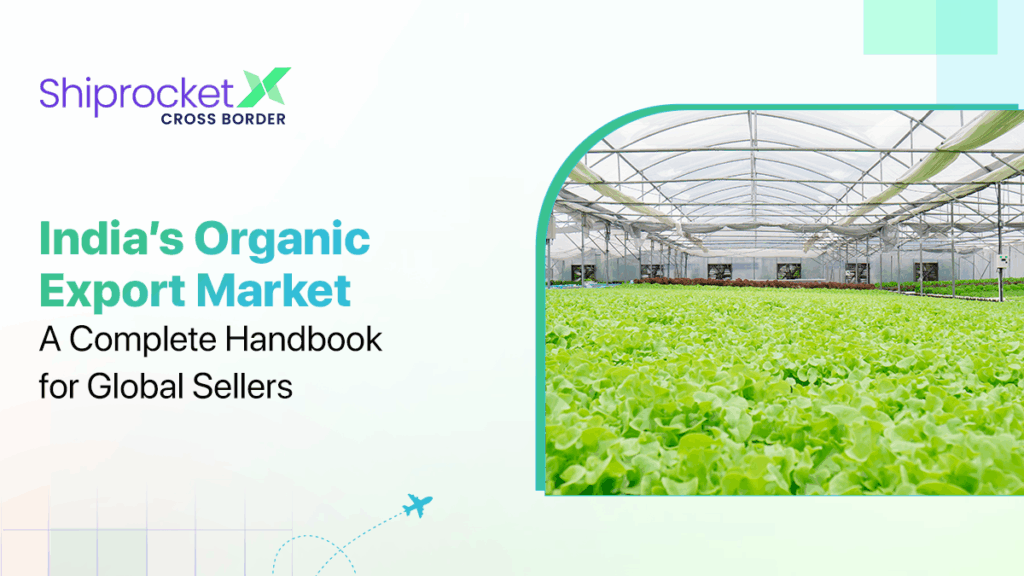How to Export Organic Products from India?
- What Are the Current Trends in the Global Organic Sector?
- How to Navigate India’s Organic Certification Requirements?
- Which Business Registrations Are Required Before Exporting?
- How Can You Ensure Quality And Packaging for Export?
- What Documents Do You Need to Export Organic Products?
- How Should You Ship And Handle Organic Products?
- How Can You Ensure Hassle-Free Customs Clearance?
- What Are the Best Strategies to Promote Your Organic Brand Globally?
- How ShiprocketX Simplifies Global Shipping for Organic Sellers?
- Conclusion
The export of organic products from India refers to selling certified organic agricultural produce, such as rice, tea, pulses, and fruits, to international markets. These products are grown without synthetic chemicals, ensuring sustainability and compliance with organic farming standards. Major destinations include the USA, EU, UK, UAE, Australia, and Canada, with demand rising steadily year after year. Export of organic products to these countries witnessed a considerable increase of 34.6% in 2024-25 from the previous fiscal year. In terms of volume, the shipments increased by 4% to 368,155 tonnes in 2024-25. By supplying organic products worldwide, India not only supports sustainable agriculture but also opens the door to the international market. Some of the most commonly exported products from India include rice, tea, fruits, pulses, and oilseeds.
To achieve success and establish a name in the international organic market, it is crucial for exporters to focus on product quality, traceability, sustainable packaging, and compliance with all essential country-specific regulations. This blog outlines every step, from certifications and compliance to packaging, logistics, and promotion, to help Indian exporters in the organic trade.

What Are the Current Trends in the Global Organic Sector?
The global organic products market has been witnessing a remarkable growth in recent years. Therefore, it is important for producers, exporters, and policymakers to understand the key trends in this global organic sector. Some of these essential trends include:
- Digital Traceability: The sourcing and certification process for organic products has become more transparent and easier with the advent of QR codes and blockchain technology.
- Sustainable Packaging: The packaging has now become eco-friendly, biodegradable, and recyclable.
- Organic Cosmetics: Along with organic food, there has been a rising demand for beauty and apparel. Thus, organic labels are gaining traction in these sectors.
- Government Incentives: Many countries around the world are now offering subsidies and certifications to encourage people to take organic farming and practices seriously. For example, India’s “Paramparagat Krishi Vikas Yojana” aims to develop sustainable models of organic farming.
How to Navigate India’s Organic Certification Requirements?
The Agricultural and Processed Food Products Export Development Authority (APEDA) regulates the certification process of organic products under the National Programme for Organic Production (NPOP). It ensures that the standard of the organic products is strictly maintained from the farm to the market. To obtain certification, you can follow these steps:
- Choosing a Certification Body: Firstly, you have to ensure that your products carry organic certification from an authorised body. In India, this is done through APEDA (Agricultural and Processed Food Products Export Development Authority).
- Farming Conversion Period: Secondly, it is necessary to undergo a transition period of 2-3 years, during which the use of chemicals can be gradually eliminated.
- Maintain Documentation: A detailed record of all farming activities should be properly maintained, including input usage and data related to harvest data.
- Undergo Regular Inspection: Ensure that a certified body audits and tests the soil once a year.
- Follow Labelling Compliance: Once the organic certification is successful, you can use the “India Organic” logo on the product.
Which Business Registrations Are Required Before Exporting?
Every business needs to complete some essential registration processes before exporting its products from India. These registration processes comply with legal and regulatory frameworks, ensuring that customs clearance and global trade operations proceed smoothly. Some of these essential registration processes include the following:
- Import Export Code or IEC: All exporters need to acquire an IEC from the DGFT.
- GST Registration: Exporters need GST registration for tax compliance and also for claiming GST refunds on exports.
- Company Registration: You have to register your business as a sole proprietorship, partnership, LLP, or private limited company.
- APEDA Registration: This is required for exporting agricultural and organic products.
How Can You Ensure Quality And Packaging for Export?
To export organic products to the international market, it is essential to maintain high quality and proper packaging, so that you can build trust and meet global standards in the export market. Some of the most essential guidelines that the exporter should follow for ensuring product integrity during transit include the following:
- Adherence to Quality Standards: You have to check and follow the rules, regulations, and certifications required in the destination country, such as NPOP or USDA Organic.
- Product Inspection: It is essential to perform pre-shipment testing to verify residue levels, moisture, and contamination.
- Appropriate Packaging: It is necessary to use export-grade, eco-friendly, tamper-proof materials for packaging the product to be exported.
- Labelling Compliance: The product must have a batch number, organic logo, country of origin, and expiration date.
What Documents Do You Need to Export Organic Products?
To export organic products to foreign countries, the exporter must have a specific set of documents, such as:
- Import Export Code (IEC): This is a mandatory business identification document for all exporters.
- Organic Certificate: This certificate is issued under NPOP, which confirms the organic status.
- Phytosanitary Certificate: This is another essential document that ensures that the shipment is free from pests and diseases.
- Invoice and Packing List: This document provides a detailed list of quantities, prices, and packaging specifications.
- Bill of Lading or Airway Bill: Bill of Lading serves as proof of shipment and provides transport details.
How Should You Ship And Handle Organic Products?
When shipping organic products to any foreign country, special care must be taken to maintain integrity and meet international standards. Proper handling throughout the supply chain ensures that the organic status remains intact. Some of the most essential considerations that every exporter should take are listed as follows:
- Usage of Certified Transport and Storage: It is essential to ensure that the vehicles and warehouse used for exporting the product are free from any contamination.
- Segregation: Ensure that organic products are kept separate from non-organic products to minimise the risk of cross-contamination.
- Temperature Control: Perishable goods and those with a fixed shelf life require temperature control in accordance with the standard temperature control system established by the relevant authorities.
- Proper Labelling: The organic status of the product should be marked clearly on the cartons and pallets.
- Compliance with Destination Requirements: The specific shipping and packaging norms of the importing country must be followed properly.
How Can You Ensure Hassle-Free Customs Clearance?
Smooth customs clearance is important for exporting organic products without delays, penalties, or rejections. This will help in avoiding unnecessary delays, fines, or rejections. Some of the essential steps that ensure hassle-free clearance are:
- Accurate Documentation: Ensure that all export documents, such as the invoice, packing list, IEC, and organic certificate, are complete and in order.
- HS Code Classification: The Harmonised System (HS) should be used correctly to avoid misclassification.
- Licensed CHA: Take help from Customs House Agent (CHA) to manage the custom processes efficiently.
- Stay Updated: It is important to know about the latest customs regulations of both importing and exporting countries.
What Are the Best Strategies to Promote Your Organic Brand Globally?
To attract international buyers and earn their trust, it is essential to focus on strong branding and digital presence, as well as forming strategic partnerships. Some of the key strategies that you need to follow to promote your organic brand in the global market are listed as follows:
- Participating in International Trade: Participation in various international trades organised in India and abroad helps exporters of organic products connect with global buyers.
- Leveraging Digital Marketing: To build global visibility, it is essential to use SEO, social media, and email campaigns.
- Collaborate with Global Distributors: The exporter should form partnerships with retailers and eCommerce platforms abroad.
- Community Engagement: Share your brand’s mission, values, and ethical sourcing practices through storytelling, customer reviews, and sustainable initiatives.
How ShiprocketX Simplifies Global Shipping for Organic Sellers?
Shiprocket X is one of the most renowned shipping platforms in India, streamlining international shipping for organic sellers. With easy order processing, real-time tracking, and reliable delivery across various countries, Shiprocket ensures that the organic products can be delivered to international customers safely and on time.
Here’s how Shiprocket X makes organic exports more efficient:
- Extensive Coverage: Shiprocket X has an extensive global reach, covering 220 territories worldwide. This helps the organic sellers export their products fast to any part of the world.
- Seamless Market Integration: The platform enables easy integration with internationally available marketplaces, such as Amazon US or eBay UK. This makes it easier for the organic product sellers to sync their orders from diverse sales channels into a single dashboard.
- Multiple Global Carrier Options: Shiprocket X has partnered with trusted global carriers, including FedEx and Aramex, and offers competitive shipping rates and diverse delivery options, including standard, express, and economy.
- Real-time Tracking: The platform provides real-time tracking of delivery status using a single tracking ID for both sellers and buyers.
Conclusion
Export of organic products to foreign countries has immense potential but requires careful planning, proper certification, and adherence to international standards. The exporter can tap into the international market and build trust in the global brand through smart marketing and strategic partnerships.
Moreover, by availing themselves of smart marketing support and leveraging digital platforms, Indian organic product sellers can develop an international brand. Trusted delivery platforms like Shiprocket X simplify the logistical complexities, helping Indian brands reach diverse international consumers safely and efficiently.







